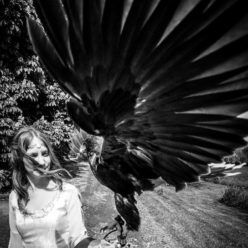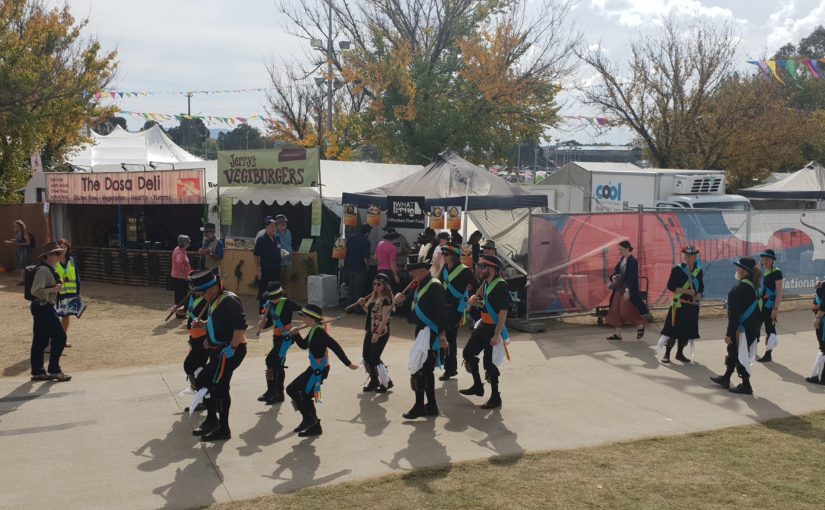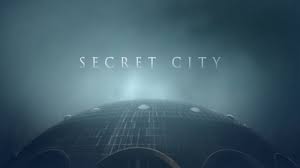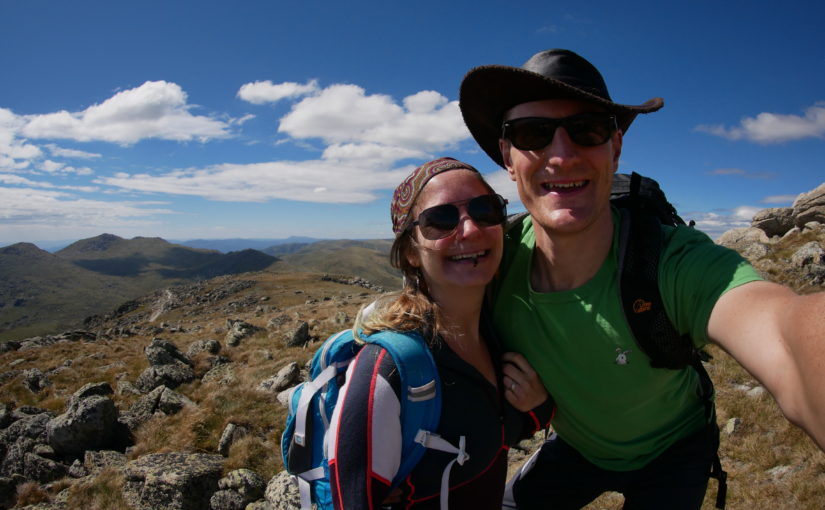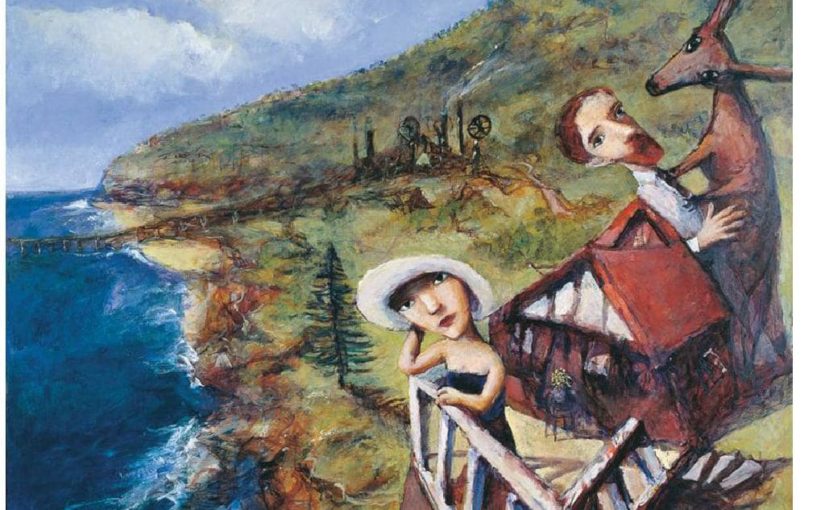Halgrim lit his pipe and leaned back against the 1975
penguin edition of D.H. Lawrence’s Women
in Love. He inhaled deeply; blew a few smoke rings, just for amusement,
then exhaled the rest of the fumes in a contented sigh.
Binky coughed pointedly.
‘Sorry old man,’ Halgrim apologised, snatching off his hat
and using it to waft vigorously in front of Binky’s nose, catching him
occasionally with the tail of it until Binky eventually sneezed. He shot
Halgrim a baleful look.
Halgrim was unaware. He leaned back at his ease again and
cleared his throat. Binky winced in spite of himself. A Reflective Monologue
was coming.
‘Well Binky,’ Halgrim began. ‘It’s the calm before the
storm. Inventories are done, and triple checked. Books all dusted. Boxes
ready.’
Binky busied himself with grooming his lower abdomen in a
stance that was befitting his view of Halgrim’s rather pompous soliloquies.
‘Then we’re all boxed up for the big journey! Australia
Binky!’ Halgrim leaned over to dig Binky gleefully in the ribs, but on account
of Binky’s grooming position, found only ear and treacherous space behind it
and nearly toppled over. Halgrim swiftly recovered his flow.
‘New climate! New landscape! New friends to be made and new
enemies to vanquish! My research tells me the spiders there don’t respond to
polite encouragement to weave their webs elsewhere but are as likely to steal
half the library and run off with books tucked up under their arms!’
Binky looked up from his grooming. Legs.
‘By Odin, we’ll vanquish them. Hmm, I’ll have to test the
humidity control there too. We don’t want pages getting damp. And see about
light. Hopefully we can keep the books away from a window, so the covers don’t
bleach. That Australian sun is pretty fierce.’
Binky could sense Halgrim was running out of steam. And
imagination. Always so when he got onto the dry subject of paperback
maintenance. He sat up and twitched his nose. It conveyed:
I’d like to see a Kangaroo.
* * * *
Within a month, and after learning a great many new
colourful Antipodean fauna-related swearwords from the book-owners as they
manhandled their one piece of furniture, 2 bikes and 33 boxes into the new
apartment, Binky and Halgrim had arrived. The new home was bigger and more open
than the last, but Halgrim consoled his agoraphobia with counting the reunited
extended book collection. This took him a considerable while as he padded his
bare feed up and down the wood shelves with his bobble hat bouncing softly on
his lower back, bathed in the sharp, clear Australian light from the large
windows with the view of the gum tree forested hills beyond. Binky hopped along
behind him, keeping vigilant watch for spiders.
‘This light Binky, this sharp, clear light; it’s so
unfeeling, it’s so foreign, so alien, Binky. It’s cold at the same time as hot,
it wants to thin the blood and impose itself.’
Binky thought this was a bit much.
To cheer him up, he handed Halgrim his sunglasses, assaulted
his Scandinavian skin with factor fifty, then rubbed his paws together
gleefully with a twitch of the nose.
How about that Kangaroo?
So they shimmied out onto the balcony and hopped down onto
the street.
* * * *
‘By Hel and Balder it’s freakin’ hot!!!!’ Halgrim screamed,
hoping about in his bare, hairy feet on the tarmac. ‘It’s hotter than Macondo!
Oh Loki, what will we do?’
The mention of Macondo reminded Binky of something crucial
and he acted fast. Grabbing Halgrim by the hairy wrist he steered him into the
nearest bar. Fifteen degrees air conditioning wrapped its cold arms around them
both. Halgrim closed his eyes and squatted down as close to the AC unit as
possible until an icicle formed at the end of his nose. A little smile grew on
his troll lips.
‘That’s better Binky,’ Halgrim sighed. ‘Well, what’s the plan?
How do we find our Kangaroo?’
Binky’s eyes examined the view from the window and plotted a
route bouncing from bar to bar for two Ks in a linear trajectory until the city
dribbled away and the bush took over.
‘Great plan Binky!’ Halgrim smiled. ‘Right, mines a VB!’
Halgrim and Binky made good progress bar hopping through
town and became quite raucous. They sampled many local drinks and entered into
enthusiastic discussions with the locals, with whom they were very popular.
Halgrim entertained them with stories about road trips in Texas, morris and
wassail traditions, the effect of heat on the people of Macondo (the locals
loved that one), when Halgrim remembered what they were supposed to be doing.
‘Hey fellas!’ he began. ‘How can we find a Kangaroo around
here?’
There followed a cacophony of sound and gabbling of strange
unfamiliar names, carelessly pronounced. Jerabomberra. Tidbinbilla. Namadgi. Places
to find kangaroos; recommendations for generally a good time; and Australian
wildlife bingo overwhelmed troll and rabbit. Finally, with adequate
instruction, Binky and Halgrim made their way out into the cooling evening.
After walking into the crepuscular air, and hours into the
moonlight, they could hear the great rolling sound of the Pacific, thundering
its oily waves in the distance. Quite some distance, but trolls and rabbits are
famous for their hearing. They rounded a corner and then encountered a huge
spider eating a lizard. Halgrim recoiled in terror and leapt on Binky’s back,
who went quite green – quite a thing for a rabbit. The spider realised she was
being watched and slid her eight eyes over to lock with theirs as she carried
on meditatively masticating.
‘mmh mmmgh, mm mh mmgmh?’
‘P – pardon?’ quailed Halgrim. Binky desperately tried to
decide rapidly and furtively which eye to look at, wondering which would cause
least offence and ruefully remembering faint hopes of ‘vanquishing.’ The spider
swallowed. They assumed.
‘I said: g’day, how y’gahin?’
‘Er, well,’ Halgrim replied, marshalling his manners, ‘thank
you, and you?’
‘Ah, smashing!’ The spider shuffled a little to the left of
the half-eaten lizard. ‘Ya just caught me at me supper there. Can I offer you
fellas ehny?’
‘No!’ Halgrim and Binky asserted in unison.
‘No worries,’ the spider assured. ‘So whattaya up to?’
‘Um,’ Halgrim stuttered, thoroughly perturbed by the concept
of a conversational spider, ‘well we’re looking for a kangaroo.’
‘Ah well mate,’ she said, ‘too easy! Keep goin’ this way a
while, following the sound of the laughing kookaburra – yeah, you’ll know it.’
She could see Halgrim’s expression clouding and looking hesitant. ‘Look, It’s
the only thing round here freakin’ laughing in this heat. Follow the sound
until you meet Kyle, he’s a rosella; red, blue and green, so he sticks out pretty well. So he tells me this bloke
has been staring at him pretty regulah, muttering about Kangaroos, so I reckon
that guy’ll take ya to a big one.’
Binky blinked at this incongruous information. He looked at
Halgrim, who was also blinking.
‘Right, well that’s…really accommodating, thank you so
much!’
‘Hey, no worries!’ said the spider, turning back to her half-chewed
lizard and winking at them with about three of the eight eyes. ‘Mind how ya go
right?’
So Halgrim and Binky followed the sound of the Kookaburra
through the bush.
‘I say, Binky,’ Halgrim couldn’t contain his thoughts any
longer. ‘Remarkably articulate, the arachnids in this country!’
Binky twitched his nose to indicate that such big bodies
must house big personalities.
‘Loki yes, they are big buggers aren’t they.’
Binky wondered if spiders who weren’t mid-supper; in fact –
hungry – were quite so congenial. Or perhaps would even consider a rabbit as an
amuse-bouche. He opened his pace.
They followed the laugh of the kookaburra until at last they
saw it perched on a branch above them. Below and ahead was a brightly coloured
bird facing them. It was stretching its wings out and flapping them slightly,
and seemingly peering over its left shoulder behind it. And there, through the
trees, muttering to himself was a small, dark man.
‘You know Binky, it’s funny; someone one told me that there
are no birds in Australia.’
Binky shot Halgrim a look that clearly retorted: what class
of imbecile told you that?
‘G’day fellas!’ Kyle the rosella welcomed them brightly.
‘Evening,’ returned Halgrim.
‘Will ya check out this crazy bloke here? Coupla times a
week he comes out here and watches me at me evening ablutions.’ Kyle flicked
and preened a few more feathers neatly into place. The small dark man in his
collar and jacket leaned forward.
Binky winced. This chap was as inadequately dressed for the
heat as some of those chaps in Macondo; a tested sign of madness.
‘Go on fellas,’ urged Kyle. ‘Talk to him. Maybe you can find
out why he keeps watching me at me personal time.’
Binky and Halgrim nodded and approached the Small Dark Man.
He wore a crisp collar – high – and a brown jacket buttoned up. His white cuffs
extended neatly beyond his jacket sleeves and his boots were clean and smart.
He wore a beard that succeeded in growing itself into a fine point, navigating
and accumulating its way neatly downwards, and his hair was flame red. As a
result; in the recent heat; he was a little less ‘dark’ than he hoped in his
description. He appeared to be muttering as they approached; Binky heard fast and
furtive expressions including; ‘it eyes me – wants me to follow it – can’t
believe a real live being here – here in the desolate bush with huge hunking
Nothing always lurking behind you – the void that horrifies man – the void…’
‘What’s he on about, Binky?’ Halgrim frowned as they
approached.
‘I dunno mate,’ called Kyle from behind. ‘But when he
arrives, at first he’s all stomping around until he sees me – scares the shit
outta the snakes – seems angry from the get-go. Maybe he’s had an argument with
his wife.’
Binky was perplexed. He gave Halgrim the worried grimace
that indicated that this may be a man with Opinions, of which they had met
several before, but this one seemed unlikely to give you a good night out first
before launching into it all.
‘Hullo old chap?’ attempted Halgrim. The small dark man,
utterly oblivious to the two behind him, started violently, then stared
piercingly at them with black eyes. It seemed to be his way of regaining
composure. His mouth began working again with the muttering in an English
accent with a hint of Nottinghamshire: ‘the men of this place – so coarse – but
free – God’s own country – I knew the bush was waiting, watching – these
irresponsible classes – democrats – but irresponsible – the proletariat in
charge…’
‘Excuse me?’ Halgrim frowned. The little man seemed to come
to himself a bit. With an expression both of indifferent disdain and also keen
interest that warned Binky of a fatally contrary character, he invited them
both home to meet his wife.
* * * *
Home was a squat white-washed bungalow with a corrugated
iron roof that both the Europeans seemed to inexplicably hate. When Halgrim and
Binky made complimentary expressions, the woman muttered something about
candlesticks and Indian sarongs – ‘taste;’ bid them admire the dahlias and
brought in tea. The small man launched into a history of his leaving Europe
which was moribund and dead, interspersed with such dubious comments about
Jewish bankers and the necessity for rule and the class system that left Binky painfully
longing for an inoffensive Halgrim soliloquy on proper hard-back preservation,
and thoroughly repentent of his earlier attitude.
This went on. The dark man had opinions on Australians.
Vacant people, irresponsible people, he said, free, raw and loose, but no inner
life. No individual soul. Halgrim attempted to counter this; he’d found them
very congenial, he said, very kind. Oh yes, the dark man continued, of course
they are, but they have no depth. Halgrim conceded he had only spent an
afternoon with a bunch of chaps which is perhaps not enough time to assess and
interpret the psychology of an entire nation; but when the little man sagely
declared his experience extended as impressively long as a week, Halgrim
retracted this concession at once.
And on. The small dark man had opinions on miners and their
clothing. He had extraordinary opinions on male friendship. It seemed to
involve a lot of clasping. He had opinions on masculinity and what a Man was.
He had opinions on politics, socialism, order, power. Suburbia, common people.
Women.
Here we go, Binky thought, rolling his eyes. Go on – I bet you’ve got opinions on how women ought to have orgasms. And indeed he did: if she moves, she’s a lesbian, the clitoris doesn’t get a look in and if she climaxes before you, it doesn’t count. Binky sighed a rabbit sigh. He was tired of all this and hopped out onto the veranda to survey the bush and perhaps spot a kangaroo, leaving Halgrim to argue, or at least insist that no one ought to argue about a thing of which they could know nothing.
‘Man to man, here Halgrim, you’re a worthy opponent in
argument,’ the small man continued. ‘We could be Mates. A manliness, a power
struggling between us. I find you immutable. There is something dark and strong
in your soul; a power in your loins.’ Halgrim hastily checked the fastening of
his red dungarees.
‘I am very well read, I must admit,’ Halgrim said. ‘Of
course, it’s obligatory as a book guardian. Reading makes you very open minded
to people and their thoughts.’
‘Yes!’ the small dark man leaned forward eagerly – Halgrim
flinched in case a Clasping was coming – ‘which is why you need to listen to
more of mine!’
‘Actually,’ interposed Halgrim firmly, ‘we are engaged. My
war bunny and I are looking for a kangaroo.’
Abruptly, the small man stood up. He began pacing the room
vigorously, a frown creasing his brow.
‘I was afraid of this,’ he said darkly. ‘I can introduce you
to the kangaroo. But should I? I am not committed myself yet. Am I done with
Man yet, or must I have one last fight, and struggle with them? Is my destiny
with Man, or am I finished with them? Is there really only one kind of power,
the unsayable, dark God of the loins…’ Here the small man’s wife rummaged in a
drawer and brought out some cigarettes. Then, seemingly having heard all this
before, went out onto the veranda to smoke with Binky.
‘Well, never-mind all that loin stuff,’ Halgrim interjected
impatiently. ‘If you know a Kangaroo, then let’s go right now. I promised my
war bunny a kangaroo, and by Loki, he’ll have one.’ They immediately set out.
* * * *
They arrived in the centre of town. It was dark and there
was a considerable commotion outside one of the public buildings; a crowd
outside of it. As their journey had become more and more urban, the spirits of
the War Bunny; more and more forlorn. Back to town; there must be some mistake.
There could be no kangaroo here. But as the shimmering lights of bars whizzed
by, rapidly departed were alternative hopes of sacking this off and going for a
drink.
They were ushered into the building where chairs had been
set out facing a stage with a lectern. Halgrim flinched, but sighed with relief
when the small dark man sat down next to him. A speaker came out and took
position on the little raised dais and began. He was a tall man, with a long
and lean face; rather like a kangaroo, with a portly, marsupial pouch-like
belly. His shoulders drooped and he stooped his body shyly, but there was a
kindness in his spectacled eyes and a set firmness about his mouth. Binky,
aware of the impact of this sort of narrative description, sighed another
rabbit sigh and steeled himself.
‘Men,’ began the kangaroo man. Binky, a rabbit, found this
regressive. He looked around him. It occurred to him for the first time how
singularly similar this group of people were. All men. All white. No women. No
rabbits. He’d read about aboriginals; black skinned and decorated with white
paint and bright bandannas the reds, browns and tans of this country. He
wondered where they were.
‘Men!’ reiterated the kangaroo man. ‘The time is for Love! A
real mate-love between people! And for love to flourish, we must have Order, to
remove physical misery as far as possible. And that you can only do by exerting strong,
just POWER from above. I don’t believe in education. In ninety per cent of
people it is useless. But I do want that ninety per cent to have full,
substantial lives: as even slaves (another despairing sigh here from Binky who
then looked imploringly at Halgrim) had under certain masters…’
Halgrim took a deep breath. He fished about in a deep and
hidden pocket for his bottle of Aquavit which he kept about him for emergencies
of patience. He took a quick gulp, then grabbed the small man by the elbow and
Binky by the ears and ran out of the lecture hall.
The small man was furious. He stormed. Grimly and silently,
but he had a talent for it. He did some hard staring and thinking at Halgrim,
then turned away, thinking more silent (thankfully) lengthy thoughts, then
turned back to Halgrim.
‘Forgive me,’ began Halgrim. ‘But that man was just spouting
right wing fascism. It’s all dressed up as a benign, god-like love, but you
can’t just say ‘oh mine’s the best way, so for your own sakes, you’ve got to do
it,’ because that is fascism. I’m an
educated troll, I won’t be duped. And more to the point, IT’S NOT A BLOODY KANGAROO!!’
The small dark man’s face contorted with mysterious rage.
Loin-rage, probably.
‘Still the fighter,’ he jeered to Halgrim. ‘Well, let’s
fight it out. One of us will be master. I can’t say I don’t admire your life
force, because I do, but we must fight it.’
‘You want to wrestle?’ Halgrim asked, amazed.
‘Naked,’ answered the small dark man. ‘One of us must be
vanquished!’
Now Halgrim had always been a peaceful troll. He was not
violent by nature (this is, in fact, a common misconception about trolls),
always fighting with the pen or with words – the proper weapons of the book
troll. But the disappointment Binky had suffered on this wild kangaroo chase,
the piffle he’d listened to for four solid hours, the insult done to reading
and intellect, and humanity. The trigger of the word ‘vanquish.’ Halgrim knew
his destiny. He once more reached for the Aquavit, kept handy for emergencies
of strength (for he was but a small troll), and drank lustily.
‘You want to wrestle naked?’ Halgrim confirmed, wiping his
mouth on the back of his wrist. He returned the bottle to its mysterious
pocket.
‘Fuck it. Alright.’
* * * *
Back at the small, dark man’s bush bungalow, Binky Prepared
the Room. The door was locked. Furniture was pushed back against the walls and
troll and man undressed. The small, dark man’s body was white and thin, but
with a core of strength or some such thing. Halgrim’s was what you’d expect
from a troll. Corpulent in places and very hairy.
Binky looked seriously from man to troll. Then with a small
bow of the ears, the signal was given and the fighters connected.
They grappled severely for some time, the only sound was
grunts and slaps as the bodies writhed; trying to get a hand hold on each
other. At times it seemed the small, dark man had the upper hand, size helped;
but it’s certainly not everything as he reached for Halgrim who suddenly was
never there and always out of reach; his small hairy feet whipping away, his
head always an inch or two away from where was lunged at. The small man’s fury
darkened. ‘You will submit!’ he roared.
Halgrim suddenly contorted like a brown snake and pinned the
man to the floor. Both wide feet were firmly planted on the biceps of the man
who could no more shake off those sturdy feet than he could bend his legs right
forward to whip Halgrim backwards. The book troll stood firm, seething and let
out his own troll roar with all the force of an Icelandic revenge saga.
‘You’re a pompous arse!’ he shouted in the man’s face.
‘You’re the son of a bloody miner; how dare you give it all this ‘responsible
classes’ nonsense?! And have you ever even met a bloody woman or are they just
things in your mind you make up?! So you
found your mother overbearing even though you admired her; you’re not the
first; have a bloody conversation with her and talk it out!! I mean, haven’t
you ever heard of Freud? And if you’re in love with men, can’t you just tell
them and have a meaningful conversation about it instead of having to fight
them?!’
Here, Binky clapped his ears fervently. He abhorred toxic
masculinity.
‘So bloody well stay there,’ Halgrim continued to roar,
‘until you have worked some of this nonsense out for yourself!’
Halgrim redressed in his uniform with as much dignity as he
could muster. Binky stayed staring down at the cowering small dark man to make
sure he did not move. His eyes conveyed his contempt for the man. Kangaroo
fucker, they seemed to say. Troll and rabbit turned their backs on him and the buxom,
intelligent woman who was his wife came in from the veranda. She eyed her
husband upon the floor with an arched eyebrow, and wordlessly lit another
cigarette. After puffing three times
deliberately while staring down at the whimpering man, she went back out onto
the veranda.
Halgrim the book troll and his war bunny Binky went out into
the Australian night.
* * * *
As the two figures strolled around the bush, it was nearly
dawn. They admired the huge fruit bats returning to their trees to sleep for
the day. They tried to enjoy themselves, after the horrors of the night.
‘I am sorry old rabbit,’ said Halgrim, sadly. ‘Quite a
fiasco wasn’t it?’
Binky sighed a rabbit sigh.
‘But there is always another day Binky, don’t lose heart!’
Halgrim persevered with cheering his war bunny up. Binky’s expression intimated
that he bet Kangaroos don’t even bloody exist anyway.
‘Daaaw now!’ comforted Halgrim. ‘We’ll find one!’ Then as
the sky’s grey turned whiter, they heard the first call of the kookaburra.
‘Hey fellas!’ it laughed. ‘Howdya get on with ya kangaroo?’
‘Yes, not so well,’ Halgrim replied sullenly. ‘I’m glad it
amuses you.’
‘Aw mate, look, this isn’t personal,’ the kookaburra
continued to chuckle, ‘it’s just how I talk right? So no kangaroo? But there
are heaps around here. Wait a minute.’
The kookaburra flew off and there was a great cackling in
the air. Binky’s eyes conveyed mirthless fatigue.
And then strode forth from the bush a tall man, straight,
with black skin and hair woollier than Halgrim’s. His skin was painted with
geometric white patterns and he had a tasselled red cloak and intricate spear.
Binky looked up at him in wonder. Halgrim approached.
There are over six hundred indigenous languages in
Australia. By the time Halgrim had got to thirty-seven, Binky needed the loo,
so hopped off for five minutes. On his discreet return, Halgrim appeared to
have had the necessary breakthrough. Man and troll talked earnestly for some
time. When they began chuckling, Binky rather feared they had got off topic.
Halgrim was holding his hands out as if indicating the size of something. The
warrior laughed again. It seems humanity has some beautiful things in common
across the world and some words transcend translation. Binky smiled a rabbit
smile.
The warrior beckoned to them and indicated for silence.
Another gesture that is universal. He led them a few meters forward into the
bush, then held back the hanging leaves of a large eucalyptus and all three
stepped out into a clearing.
As they stared, the grey shadows of trees seemed to move in
the dawn grey. Then a flush of gold as the sun threw its first liquid light
over the top of Namadgi peak and the trees turned their heads. There were
hundreds of kangaroos. A large grey picked up its long back legs from its
sideways, prone position, and hopped towards them. Its ears were long, its face
lean and serious and its leg muscles rose all the way to its small, elegant
elbows.
Halgrim and Binky
stepped forward, and troll, rabbit and kangaroo shook paws in the Eucalyptus
scented dawn.
